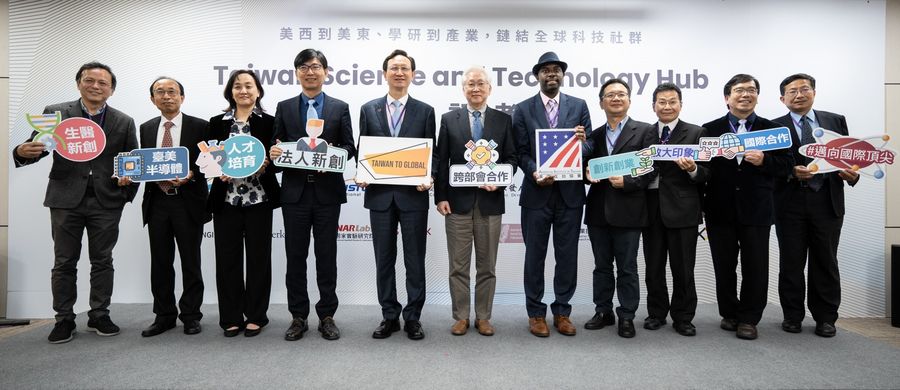Taiwan Science and Technology Hub at Stanford - A new chapter of tech collaboration between the US and Taiwan

“Roman is not built in one day. The idea of building this hub is also preparing for several years,” said Ying-Chih Chang, co-chair of Taiwan Science and Technology Hub. “Taiwan government has been launching different programs to help Taiwanese entrepreneurs and scientists to land in the US. As these years Taiwan’s tech has been reported by foreign media on the headline, it's time we deepen our collaboration with the US to next level.”
On January 3, the National Science and Technology Council (NSTC) held a press conference for the launch of the Taiwan Science and Technology Hub at Stanford University. Integrating the government’s resources, the hub will enhance the US and Taiwan collaboration across startups, scientific research, academia, and talent cultivation.

Taiwan Science and Technology Hub will set up at Stanford University. / Photograph : Wiki media
The NSTC established the Taiwan Science and Technology Hub at Stanford University to integrate a wide breadth of resources, which span from scientific research, academia, start-ups, and talent cultivation, into a single platform that will be crucial in promoting cooperation between Taiwan and the US. Through cross-ministry cooperation, the Hub will also hold a series of academic and scientific research conferences, symposiums, and workshops at Stanford University and the surrounding areas in the near future to enhance Taiwan’s international profile and impact.
“You can imagine that the hub will foster more bilateral collaboration. Not just tech professionals and scientists who want to come to the US can leverage the hub, foreigners who are interested in Taiwan also can leverage the hub, ” said Chang.
long term partnership with the US and Taiwan
The NSTC has been committed to promoting bilateral scientific research cooperation, talent cultivation, and talent exchanges between Taiwan and the US. For example, the NSTC awards grants to Taiwanese researchers to study in a variety of different fields at Stanford University through several talent cultivation programs such as the SPARK Program, the Stanford-Taiwan Biomedical Fellowship Program (STB), and the Stanford-Taiwan Social Science Fellowship Program (STSS). In addition, the NSTC provides academic research experience to doctoral students and postdoctoral fellows through the Graduate Students/Postdoctoral Study Abroad Program and the Dragon Gate Program to Stanford University.

The NSTC will coordinates cross-ministry and cross-discipline programs and allocates relevant resources. / Photograph : NSTC
The NSTC also coordinates cross-ministry and cross-discipline programs and allocates relevant resources. For this reason, the NSTC has integrated existing programs into the Taiwan S&T Hub, and the hub will support talent cultivation, conducts international exchanges. This platform will allow relevant programs to connect abroad, enhance cross-discipline academic capacities, and demonstrate the impact of Taiwan's tech power internationally.
Top scientists from the US onboard to help the Hub
During the press conference, the co-chair of the Hub Ying-Chih Chang introduced the main functions and goals of it. Subsequently, Faculty Executive Board Member Professor Philip Wong shared his views on new opportunities for Taiwan-US semiconductor cooperation. Finally, Scientific Advisor and UC Berkeley School of Public Health Dean Michael Lu discussed deepening cooperation between Taiwan and the US in public health during the post-pandemic era.
Key members of the Hub, who have extensive experience in cross-discipline coordination, possess forward-looking insight into the future of the cooperation between Taiwan and the US in critical fields such as scientific research, semiconductors, and innovation. These members will help link up Taiwanese researchers with important scientific institutions throughout the Bay Area such as Stanford University and UC Berkeley.
During Minister Tsung-Tsong Wu’s remarks, he stated that the Taiwan Science and Technology Hub is an innovative approach to address a larger set of challenges posed by international competition during the post-pandemic era. Wu said that Taiwan needs to make use of its strengths in techonology to create greater synergy.
Wu mentions that the Hub will serve as an important platform for higher education, scientific research, and industry-academia cooperation. In the future, the Hub will enhance Taiwan’s image as an important player in international research by providing opportunities for Taiwan’s scientific community and technological capacities to forge stronger connections with important institutions in the US.
〔Original :Meet Global〕
https://meet-global.bnext.com.tw/articles/view/47864